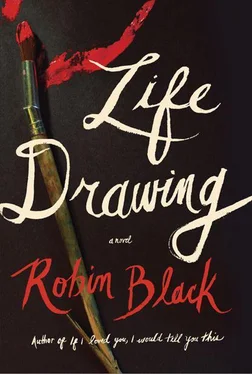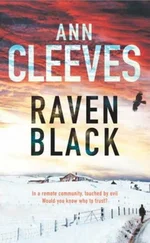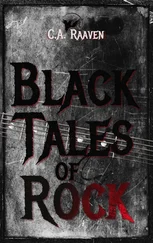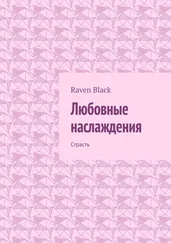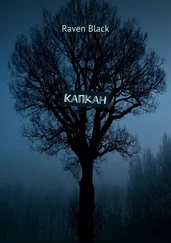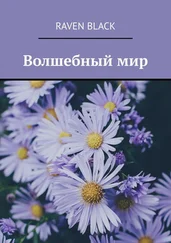“I’ve been visiting my father,” I said. “I think I told you? He’s in a home. He has Alzheimer’s. It’s been a long day.”
“How terrible. I imagine it has been.” And then, “You look like you could use a drink. Maybe even two.”
I smiled — barely. “I can see you’re going to be a bad influence,” I said. “But I think you’re right.” I looked over to the barn. “Why don’t you come over this time, though. We have a good bottle of red … Let me just tell Owen I’m home, then we’ll go inside.”
She said she would be over in half an hour. She reached over and gave my hand a squeeze before turning away.
When Owen’s work was going well, I would never knock. I’d just barge in. Even when the doors were closed. I knew he wouldn’t hear a knock if he was really absorbed. He would be far, far away, in another place and time.
But I had learned during those months of his frustration to pause at the door and at least give him a warning shout. Not because there was anything happening that I might derail with an interruption, but because he felt ashamed. He needed a moment to arrange his expression or maybe to set himself up at the computer as though he were engaged. We’d never had that conversation, he’d never asked that explicitly of me. But I had learned. And so, that day, at the top of the great wide ramp to the open barn doors, I knocked and I called, “I’m back.”
“Oh, good. Come on in.”
Without question, the barn is the most spectacular space on the property. Cleaned of all trace of the livestock it once housed, all that remained was the shell. Pennsylvania bluestone floors. Wood walls of horizontal planks, heavy beams, a vaulting ceiling into which we had cut four skylights that we’d framed in old weathered barn wood. It had the cool hush of a church.
“How was it?” he asked.
“It was the same. It was sad. I’m tired.” I walked over and touched his shoulder, gave it a quick kneading. I didn’t ask him how his morning had gone. “Alison stopped by,” I said, stepping away. “We’re going to have a glass of wine. Or something. Two glasses of wine. She rightly diagnosed my need.”
He looked at me, a smile hovering there. “Tell her I said to get you good and drunk. I wouldn’t mind an afternoon like last night.”
“You and me both,” I said. “Feel free to join us. For drinks that is.”
“Very funny. But I think I’ll keep at this a while more.”
“Sounds like a plan,” I said, never quite sure how to respond when I sensed Owen digging himself deeper into his seemingly endless futile pursuit. And then, “See you in a bit.”
We sat in the living room, Alison on the pale, slipcovered love-seat that had come with the house and I on the pumpkin-colored wingback chair we’d chosen from the relics in Owen’s aunt’s home. I poured us each a large glass of wine. Very large.
Alison commented on the beauty of the house, the old random-width floors, the stone hearth, and I thanked her. She asked if the room beyond the French doors flanking the fireplace was my studio, and I said it was.
“I’m sorry if I seem a bit out of it,” I said. “The visits to my father … they never fail to upset me.”
“No, I’m so sorry,” Alison said. “It does seem like a terrible … passage. A terrible way to travel through the final years.”
“Yes. Yes, it is.”
I asked her how her morning had been; but then, as she answered, I felt her words floating all around, not quite finding their way into my consciousness, my attention riveted elsewhere, a million miles away, back to my father, back to my childhood — and then finally fixed on a painting of mine above our mantelpiece, an oil of an old milliner shop in South Philly, facing out from inside, looking through the window filled with finished hats on mannequin heads. The first painting I did after Bill. The painting that marked the true start of my recovery from all that heartache. I stared at it as if it might steady me, like a spinning dancer finding a single focal point.
“Is that one of yours?” Alison had followed my gaze.
“Yes. I’m sorry. Yes. From a few years ago. But I don’t mean to zone out … I’m afraid I really am tired.”
“I like it very much. And you should just relax. Don’t mind me. Unless you’d like me to go …”
“No, no, not at all. I’m just sorry to be a bit out of it. But very glad for the company.”
“I love the hats,” she said. “Every detail is so … so vivid. Even the netting. You must use a single-haired brush.”
I laughed. “Not quite, but close. I thought I might paint just the window, from the outside, I mean. It was so … so beautiful and I’ve always been drawn to exteriors. But then … then I ended up not finding the hats as interesting as the scene behind them. Also, it was very cold outside.”
Cold outside. And cold inside of me. A full year after Bill. Eleven months after my confession to Owen. My heart like a single tooth, sharp and useless; my ability to paint, frozen, perhaps forever stilled. I’d found Steinman’s one afternoon on a directionless, miserable walk that had promised nothing beyond freedom from the frustrations of my studio. I had stumbled across this tiny store, a bright red door, gold lettering, the elaborate hats, beautiful, fantastical against the dingy gray of Fourth Street.
“It seems like a long time ago.” That wasn’t entirely true. At moments, it seemed like I could stand up, turn around, and walk right back into that time. “I loved it there,” I said.
That part was true. The place had been run by an older pair, a brother and sister, Len and Ida Steinman, both in their early seventies. Neither had ever wed and they had an intimacy like that of a couple, so at first I had thought them married. He was tall, taller than Owen — which, coming from my family of short Jewish men, surprised me. She was tiny though. Birdlike. And beautiful. She had such an elegance to her. The shop itself was a mess, the sort of chaos only the owners of such a workshop could navigate; but she was anything but. A polished gem among the filmy fabrics and odd forms on which the hats were built, she was breathtakingly complete in a sea of aspiration.
“The light is incredible,” Alison said. “Why am I sure it was winter?”
“It was. Winter light. It’s got a certain clarity. Also, through the window, see? That tiny tree way down the street is bare. It doesn’t jump out, but it registers, I think.”
I’d sat in that store for weeks, doing sketches, then setting up an easel, bringing in paints, hoping no one would complain as the air took on the new smells. Neither Len nor Ida appeared in the painting — except for one of Ida’s arms. I’d wanted to paint all of her, a rare impulse for me. But I had felt too daunted to try. Even apart from my poor portrait skills, I was sure that her essence contained an element of perfection I had no right to try and channel. Me, in my fallen, repentant state. So I spent all those weeks with my eyes on the rolls of tulle and the fabric flowers, the light slipping around the gold lettering in the window; and I stole long, inexplicably hungry looks at Ida Steinman. I could detect it in the painting still, the way that she was neither in nor out, that navy serge jacket sleeve, child-sized, hovering at the edge of the canvas, at the edge of my consciousness.
“It isn’t one of my favorites,” I said. “Owen loves it though. He more or less insisted we hang it there.”
But I didn’t want to discuss the painting anymore. It was like hearing the ocean, waves crashing, the memories beginning to pound against my thoughts as we spoke. How often had I sat with Owen just like this, in the aftermath of my time with Bill, my heart breaking, my energy all directed toward hiding that fact? I had been well practiced then at secret oceans, secret waves, adept at splitting myself in two. Now I just wanted to move off that subject, that time.
Читать дальше
